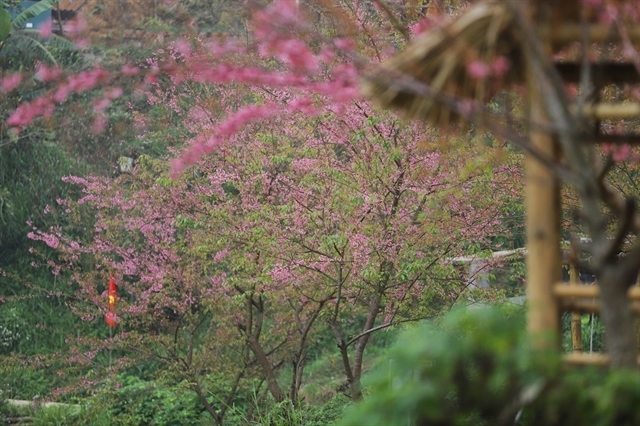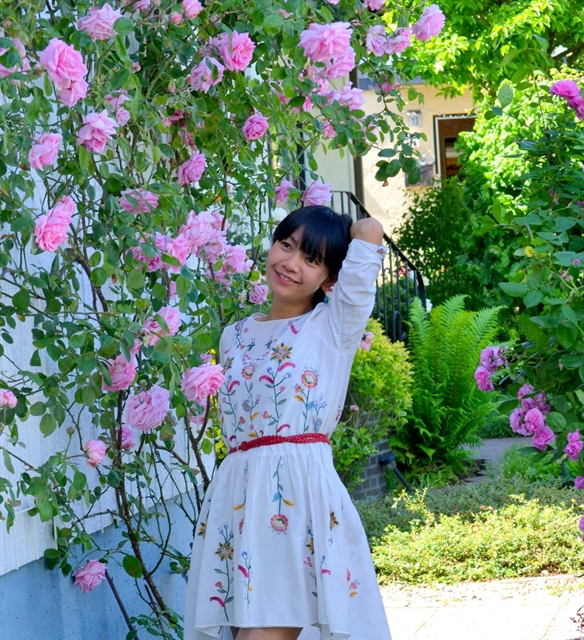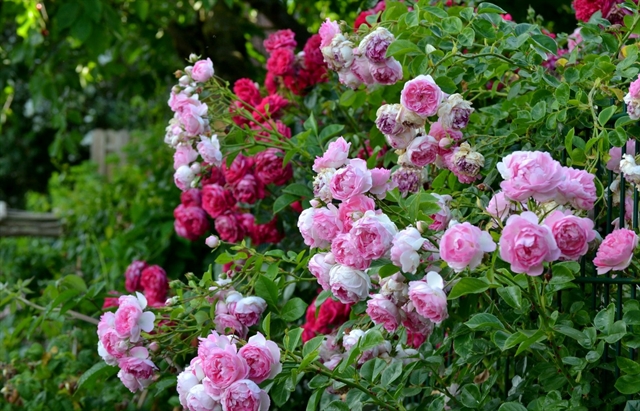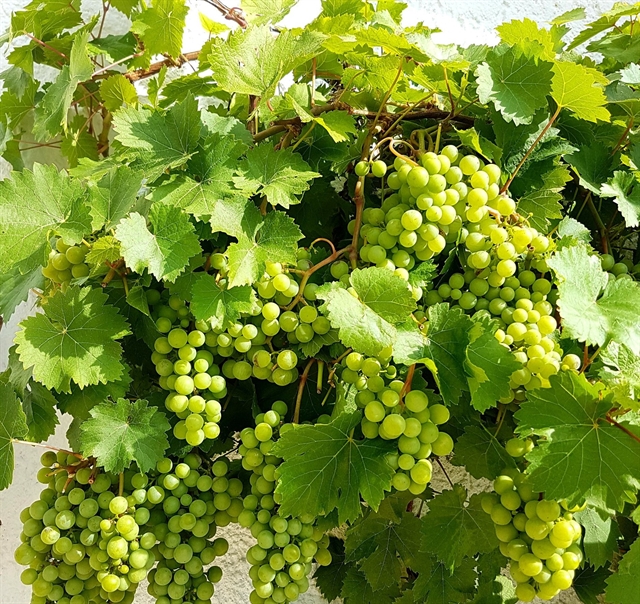 Features
Features

In a small garden on the outskirts of Frankfurt am Main, a city in western Germany, a variety of flowers are in full bloom. It is the work of Vũ Thái Hà, who holds a master’s degree in Education from the Goethe Frankfurt am Main University and is now working in the country’s education sector.

|
| PRETTY IN PINK: Vũ Thái Hà with the roses in her garden. Photo Thai Ha Vu Facebook |
By Phương Hà
In a small garden on the outskirts of Frankfurt am Main, in Germany’s west, a variety of flowers are in full bloom, like jasmine roses, Leona da Vinci roses and tulips, revealing their elegant beauty and delicate fragrance to the world.
The beautiful flowery garden is the work of Vũ Thái Hà, who holds a master’s degree in Education from the Goethe Frankfurt am Main University and is now working in the country’s education sector.
She also has a particular interest in planting flowers during her free time. Entering her beautiful garden, where all types of roses bloom and fruit grows, visitors may feel as though they’ve stepped into a fairyland.
“When I moved here a few years ago, the yard was just a pile of rubble and rubbish,” Hà remembered. “The garden looked more like a forest, with big trees growing all over the place.”
“It took me a lot of time and effort to clear it all up, but I left the old fruit trees in place, as they became part of my plan to give the garden a new lease of life.”
Her garden’s not especially large but has enough space for a small vegetable plot, a little rabbit hutch, a pond with fish, and fruit trees bursting with cherries, grapes, quinces, plums, and strawberries. The highlight of the picturesque scene, though, is the wide range of flowers, like daisies, carnations, tulips, and, in particular, various kinds of roses.

|
| PLEASANT ON THE EYE: Hà’s garden of beautiful blossoms. Photo Thai Ha Vu Facebook |
Living in an area where many varieties of flowers are available and easily grown, even, with some effort, during winter, Hà has plenty of choice as to what will colour her garden. The sun shines more often than you might imagine for Germany, so different kinds of flowers are on show for a large part of the year.
Overlooking a vast field, her garden is frequently visited by the local wildlife, such as birds, bees, butterflies, and even porcupines. Deer and hares can also be spotted from her living room window.
“When I started to plant roses, I wasn’t really thinking about growing the fruit,” Hà said. “I also wasn’t considering picking my most beautiful flowers to make tea.”
“I think I’m just a rose enthusiast who is fortunate enough to have a garden with good soil in a place with a suitable climate. I’m not relying on any experience or using secrets -- my lush roses just seem to grow that way.”
She spends a lot of her free time in the garden, not just taking care of everything but also just breathing in the wonderful fragrance. For her, her roses are an endless source of positive energy.
Frankfurt boasts the elements needed for such a brilliant garden, with a mild, cool, dry, and sunny climate, and Hà has selected strong varieties that are resistant to pests and disease and able to bear flowers many times a year.
When the roses get “sick”, the troublesome branches are removed and the trees given time to recover. The quality of the soil is critical and needs to be monitored as the seasons change. She uses organic fertiliser twice a year, after trimming the branches at the end of spring and after the first flowers wither in early autumn.
Hà doesn’t use any chemicals to give her roses a kick along. Rather, she follows planting and gardening techniques that are friendly on the plants, the environment, and herself.

|
| CYCLE OF LIFE: Hà also grows fruit in her garden, like cherries, grapes, quinces, plums, and strawberries. Photo Thai Ha Vu Facebook |
While birds and ladybugs deal with most of the insects taking an interest in the garden, egg shells and banana peel have proven to be excellent natural fertilisers.
The trees, she said, should not be watered excessively and then only the roots, not the leaves, unless there’s an insect problem. Flowers that have begun to wither should be trimmed down to the branch so that all of the sustenance is saved for the next bloom.
Winters in Frankfurt am Main are freezing cold, with snow and below-zero temperatures. In her garden, Hà only trims the unnecessary branches, with a particularly clean pair of scissors, and checks how the roots are handling the snow and ice. This is why many of her plants can bloom during winter.
Another “trick” of Hà’s is digging a big hole when re-planting an old tree or planting a new one, filling it with water, and then putting the old soil back in, which quickly becomes moist. The roots need watering every day after planting, helping them reach deeper into the soft surrounding ground.
“I’ve come up with some good ideas and insights about my work while spending time out here in the garden,” she said. “I really think the fragrance of the roses makes me more active and energetic at work.”
“My roses have also inspired me to live life close to nature and to cherish what I have, even in difficult times.” VNS




